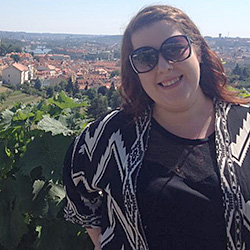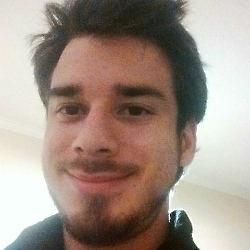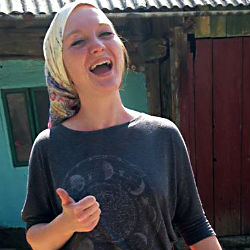Arts Menu
Student Success
Anthropology inspires career in human rights
Kenna Sim chose TRU for practical reasons — saving money by studying in her hometown and benefiting from one-on-one interaction in small classes. But she also recognized the unique opportunities.
"You truly have freedom to pursue your passions and develop your talents. Over my four years at TRU, faculty and staff have been nothing but supportive of my endeavours and helped me grow as a person."
Her long-time interest in social justice and global issues led her to focus on anthropology. She found that the program gave her a more rounded perspective on the world and helped her consider other people's viewpoints.
"I was interested in the Aboriginal Studies Certificate because one anthropology class I took on Canadian Native Peoples opened my mind to issues Aboriginal people face in Canada. It changed my life in that it exposed me to new perspectives and made me want to further educate myself on Aboriginal issues."
After Kenna's first year, she took part in a field school in Czech Republic, Slovakia and Ukraine. The group's time in a Romani community was especially enlightening.
"Meeting these people and seeing their struggles really opened my eyes to Romani issues and is what inspired me to pursue a career in human rights. When I returned from the field school I wanted to continue traveling, especially Central/Eastern Europe. In my third year, I studied abroad at Wroclaw University in Poland."
On top of all that, as an Arts student, Kenna developed the ability to understand and evaluate issues, and gained experience with composition and communication. In the short term, these helped her during a co-op term as special events and communications coordinator with the Royal Inland Hospital Foundation. But she also has bigger goals in mind.
"Being able to argue a point and support it is a skill that will really help me in my future career in the field of law."

It changed my life in that it exposed me to new perspectives and made me want to further educate myself on Aboriginal issues. Kenna Sim
Anthropology opens a new world of diversity
Lachlan Gonzales loves to learn about the differences between cultures — different ways of knowing and learning, understanding and being. So anthropology was a natural fit.
“Learning about native culture, specifically, was incredible because it opened my eyes to a new way of understanding. Not better or worse. Just different.”
The program at TRU exposed Lachlan to people from a variety of cultural backgrounds. A multicultural classroom meant students could learn from each other and from the rich culture here in Canada.
“I always cherish the fact that I can walk down the halls of TRU and see and hear so many cultures from all over the world. The anthropology program here has opened my eyes to a rich and beautiful world of different peoples.”
He is working on a Master of Education degree at TRU and plans to become a high school and university history teacher.

The anthropology program here has opened my eyes to a rich and beautiful world of different peoples. Lachlan Gonzales
Field school sharpens language skills
For Annie Slizak, the Romani Field School was like a big package of goodness: she could earn six credits, finish her degree a semester earlier, explore her Ukrainian heritage, and learn a new language.
“The opportunity to learn more about a new language was one of the biggest driving reasons towards my decision to go on the field school, as I am very interested in language at its core and I was so excited to start learning another one.”
Field school students were immersed in the Romani culture, so Annie found herself needing to adapt as well as to learn.
“It was a big leap for us to dive right into a culture that speaks a different language. However, we learned to get by and were able to communicate fairly well, even though we didn’t speak the same language.”
Annie feels the language skills she picked up during field school have helped her become a better English tutor and editor. She is currently working towards a certificate in Teaching English as a Second Language.
“I firmly believe the intercultural communication skills I learned and practised in Slovakia and the Ukraine will help me become better at what I do – be it teaching English to those who have never heard it before, or helping native speakers use it better on their own.”

I firmly believe the intercultural communication skills I learned and practised in Slovakia and the Ukraine will help me become better at what I do. Annie Slizak

